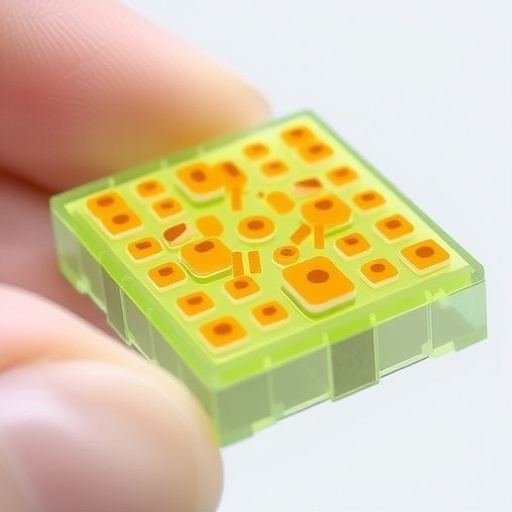In a remarkable leap forward for biomedical technology, researchers at The Hong Kong Polytechnic University (PolyU) have engineered groundbreaking 3D micro-printed sensors designed to revolutionize on-chip biosensing mechanisms. This pioneering advance presents a new frontier in early disease detection, bringing promise to clinical diagnostics with enhanced sensitivity, precision, and integration capabilities. These sensors are fabricated using cutting-edge additive manufacturing techniques that allow for the creation of extremely compact and highly customizable devices, merging microtechnology with biosensing innovation.
At the heart of this breakthrough lies the ability to microfabricate complex three-dimensional structures on a microscopic scale, a feat challenging to achieve with conventional lithography or planar fabrication methods. The 3D micro-printed sensors offer a transformative platform capable of interfacing directly with biological environments at the cellular and molecular level. This spatial precision enables the detection of disease biomarkers with unparalleled accuracy while maintaining biocompatibility, essential for real-world diagnostic applications.
One of the most striking technological advances in this work is the integration of multiple sensing elements into a single microchip, leveraging precise spatial arrangement within a nanoscale framework. This spatial multiplexing allows simultaneous detection of various biomolecules, which significantly improves diagnostic throughput and reduces time-to-result. The sensors employ novel materials with tailored electrical and chemical properties to optimize signal transduction and stability during long-term operation.
The fabrication technique employed by the PolyU team revolves around direct laser writing and advanced two-photon polymerization processes. These methods harness femtosecond laser pulses to sculpt intricate 3D architectures within photosensitive resins, achieving resolutions far below the diffraction limit of light. This innovation not only enables miniaturization but also confers greater mechanical robustness, a critical factor for sensor durability under physiological conditions.
To enhance the biosensing capabilities, the sensor surfaces are functionalized with highly selective biorecognition elements such as antibodies, aptamers, and enzyme substrates. This biochemical modification ensures that the sensors respond selectively to target analytes, such as proteins or nucleic acids associated with early pathological states. This highly specific molecular recognition, combined with the sensor’s electronic transduction, allows for quantitative measurement of trace biomarkers in complex biological fluids.
Moreover, the sensor’s architecture is designed to optimize signal amplification through nanostructured electrode arrays. By increasing the active surface area and enhancing electron transfer kinetics, the system achieves remarkable sensitivity that can detect biomarkers at femtomolar concentrations. These sensing enhancements could significantly benefit early-stage disease screening, where biomarker concentrations are typically low and difficult to quantify reliably.
Importantly, the compact form factor and integrable design of these sensors facilitate seamless integration with microfluidic systems, paving the way for fully automated, lab-on-a-chip devices. Such integrated platforms can perform sample preparation, sensing, and data acquisition within a single device, streamlining the diagnostic workflow. This combination holds immense potential for point-of-care testing in resource-limited settings, eliminating the need for bulky instrumentation and reducing costs.
Beyond diagnostic applications, the 3D micro-printed sensor technology presents an adaptable framework for personalized medicine. Because the sensors can be custom-fabricated to target specific biomarkers unique to an individual’s disease profile, they offer a pathway toward tailored diagnostics and monitoring. This customization capability is vital in managing complex diseases, such as cancer or neurodegenerative disorders, where biomarker variability challenges conventional sensing techniques.
The durability and biocompatibility of these micro-printed sensors have also been rigorously tested, demonstrating their suitability for in vivo applications. The materials used resist degradation and maintain consistent performance in physiological environments, an attribute crucial for implantable or wearable biosensors. This robustness ensures reliable, repeated measurements, enabling continuous monitoring of patient health parameters.
PolyU’s innovation not only pushes the boundaries of sensor miniaturization but also opens vistas for interfacing electronics intimately with biological systems. The potential to capture real-time molecular information with high fidelity could transform fields beyond medicine, including environmental monitoring and security, where sensitive, rapid detection of chemical agents is needed. These versatile sensing platforms represent a convergence of multidisciplinary expertise that is reshaping the landscape of analytical technology.
Looking forward, the research team is exploring further enhancements, such as incorporating AI-driven data analysis and wireless communication modules directly onto the sensor chip. This fusion of advanced hardware and intelligent software aims to deliver smart diagnostic systems that provide actionable insights without human intervention. The modular nature of the sensors facilitates easy adaptation to emerging diagnostic challenges, promising a proactive approach to healthcare management.
With regulatory approval and clinical validation on the horizon, the commercialization potential of these 3D micro-printed sensors is immense. By significantly reducing detection times and improving the accuracy of early diagnosis, this technology aligns with global healthcare objectives of disease prevention and personalized treatment. PolyU’s pioneering work embodies the future of biotechnological innovation, making sophisticated diagnostics more accessible, efficient, and responsive to patient needs.
This revolutionary advance in on-chip biosensing heralds a new era in disease detection technology, showcasing the remarkable synergy between microfabrication, materials science, and biomedical engineering. As healthcare systems worldwide grapple with increasing demands for rapid, accurate diagnostics, these 3D micro-printed sensors may well become indispensable tools in the global fight against disease.
Subject of Research:
Development of 3D micro-printed biosensors for enhanced on-chip detection of disease biomarkers.
Article Title:
PolyU Researchers Pioneer 3D Micro-Printed Sensors to Advance On-Chip Biosensing for Early Disease Detection.
Image Credits:
Images courtesy of The Hong Kong Polytechnic University (PolyU).
Keywords:
3D micro-printing, biosensors, early disease detection, on-chip biosensing, microfabrication, lab-on-a-chip, two-photon polymerization, biomarker detection, personalized medicine, biorecognition elements, signal amplification, point-of-care diagnostics.
Tags: 3D micro-printed sensorsadditive manufacturing in sensor designbiocompatibility in medical devicesbiomedical technology advancementsdiagnostic applications of microtechnologydisease biomarker detection methodsearly disease detection innovationsenhanced sensitivity in diagnosticsmicrofabrication techniques in biosensingon-chip biosensing technologyPolyU research in biosensing technologiesspatial multiplexing in biosensors





